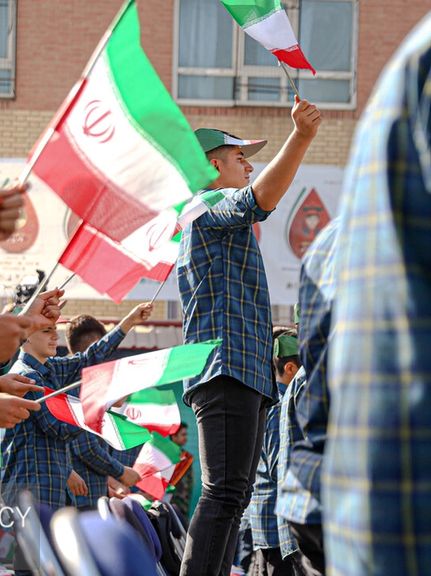Sanctions response betrays Tehran's entrenched divides, policy drift

One thing unchanged by the return of UN sanctions is Tehran’s internal discord, with hardliners and moderates battling it out over decisions ultimately taken elsewhere.

One thing unchanged by the return of UN sanctions is Tehran’s internal discord, with hardliners and moderates battling it out over decisions ultimately taken elsewhere.
Responses to the so-called snapback range from combative to despairing: hardliners celebrating, reformists urging more diplomacy and maverick parliamentarians calling for withdrawal from the nuclear Non-Proliferation Treaty or even building nuclear weapons. Amidst it all, the government appears adrift.
President Masoud Pezeshkian on Monday blamed Iran’s predicament on European states that activated the trigger mechanism, calling them “filthy and mean” without even attempting to lay out what he thinks lies ahead.
“They want us to surrender,” the president told a group of firefighters in Tehran. As for the response, “people have to resist.”
Other officials have responded with angry calls to withdraw from the NPT, ignoring the fact that exiting the treaty would further convince a skeptical West that Tehran’s self-styled peaceful nuclear program is veering toward weaponization.
Even more alarming are calls from parliamentarians and others to build nuclear weapons.
‘We should compromise’
Amid this flurry of reactionary rhetoric, sociologist Taghi Azad Armaki stood out with a different message.
“Iran should say that it is not standing against the rest of the world and that it is not going to fight the world,” he told moderate daily Etemad on Monday. “We should say that we are … ready to compromise,” Armaki added.
“The government is unable to say that, but civil society can … We should be part of the world, and not allow the world to unite against us.”
Armaki’s heartfelt pleas recall a Persian tale in which mice resolve to put a bell on a cat, only to admit none knew how—or dared— to do it.
Tall order
The only person who can end Tehran's confrontation with the West is the Supreme Leader, Ali Khamenei. Iran's ultimate decision-maker can instruct Pezeshkian to stop calling world leaders “filthy” and engage.
Since the vote last Friday, France and the UK have stressed that the snapback of UN sanctions should not mark the end of dialogue. But Iran’s current posture suggests that its temper may take time to cool and that incentives may be needed to bring it back to the table.
And that won’t be easy given hardliners' staunch opposition.
“Iran’s return to the negotiating table will not happen easily,” conservative politician Mohammad Hassan Asafari told Nameh News on Monday.
Among the many suggestions for Iran’s next move, Jomhouri Eslami editor Massih Mohajeri and Ham Mihan proprietor Gholamhossein Karbaschi noted that state TV and hardliners appear jubilant over the snapback.
Elephant in the room
Sociologist Armaki urged the government to limit hardliners’ airtime—ignoring, like almost every other voice in Tehran, the elephant in the room.
Ultimately, all decisions in Iran hinge on one man, who decided to air his views against talks with Washington hours before Pezeshkian landed in New York.
Moderate analyst Hadi Alami Fariman came close to addressing the core issue on Monday, but fell short.
“Iran has to choose between tension and diplomacy,” Fariman told reformist outlet Rouydad24. “We will not get any result without reforms … in our political structure.”
That silence underscores the impasse: until the real seat of power acknowledges the need for change, Iran’s answer to sanctions will remain more bluster than strategy.